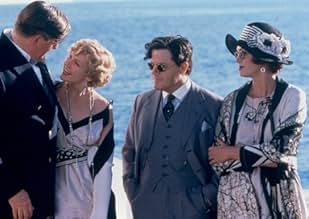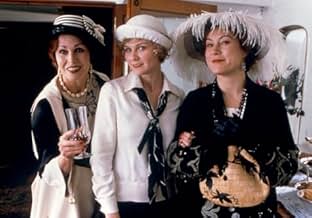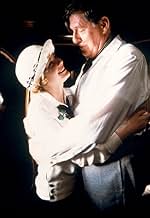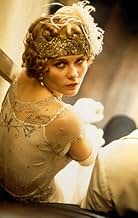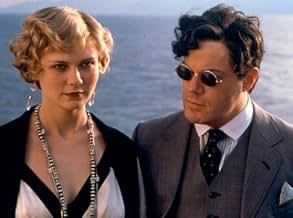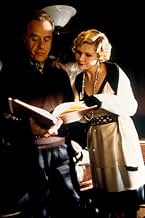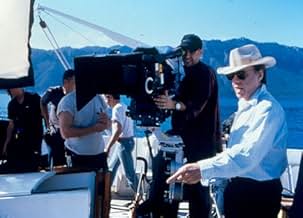IMDb रेटिंग
6.4/10
9.2 हज़ार
आपकी रेटिंग
अपनी भाषा में प्लॉट जोड़ेंSemi-true story of the Hollywood murder that occurred at a star-studded gathering aboard William Randolph Hearst's yacht in 1924.Semi-true story of the Hollywood murder that occurred at a star-studded gathering aboard William Randolph Hearst's yacht in 1924.Semi-true story of the Hollywood murder that occurred at a star-studded gathering aboard William Randolph Hearst's yacht in 1924.
- पुरस्कार
- 1 जीत और कुल 1 नामांकन
Zoe Mavroudi
- Servant
- (as Zoi Mavroudi)
Despina Mirou
- Servant
- (as Despina Morou)
कहानी
क्या आपको पता है
- ट्रिवियाThe costuming and sets were designed with as little color as possible to give the illusion of a black and white film. This was to make up for the fact that the film wasn't allowed to be filmed in black and white as originally planned.
- गूफ़The flag flying at the back of the yacht is the current US flag, which didn't come into use until 1959. In 1924, there were 48 stars in neat rows and columns 8 x 6.
- भाव
Marion Davies: Nothing can happen this weekend.
Charlie Chaplin: So what are you doing next weekend?
- क्रेज़ी क्रेडिटThe characters, entities, and events depicted and the names used in this motion picture are fictitious. Any similarities to any actual persons living or dead or to any actual entities or events is entirely coincidental and unintentional.
- कनेक्शनFeatured in Anatomy of a Scene: The Cat's Meow
- साउंडट्रैकAfter You've Gone
Performed by Kirsten Dunst with Ian Whitcomb & His Bungalow Boys
Written by Henry Creamer and Turner Layton
फीचर्ड रिव्यू
`The Cat's Meow' is a mildly enjoyable telling of a notorious tall story that has been told in Hollywood for nearly eighty years.
Super-magnate William Randolph Hearst (Edward Herrmann) invites a diverse mix of Hollywood biggest names and its oddest fringe dwellers to celebrate the birthday of famed director Thomas Ince (Cary Elwes) aboard his luxury yacht. Things begin to fall apart when Hearst suspects a guest - none other than Charlie Chaplin (Eddie Izzard), the most famous man in the world - of having an affair with his actress girlfriend, Marion Davies (Kirsten Dunst).
Although the film is entertaining, there is something underwhelming about it. Its stage origins are obvious - characters perambulate from plot point to plot point, spouting exposition, never appearing much more than caricatures, and thus failing to evoke much sympathy.
The casting of Eddie Izzard in the pivotal role of Charles Chaplin is a grave mistake, though the script saddles him with a most unsatisfactory characterisation of Chaplin to work with. Chaplin was not a serial romancer, as is implied in the film, but a serial seducer. He would have been the last person to urge a woman to run away with him on the basis of undying love. He spent his most famous years running from women who suggested exactly that, freely admitting to them that while sex was a pleasant diversion, his work came before any woman. It's a casting decision that is an obvious attempt to distance us from the Little Tramp as opposed to Chaplin the real man, but we never get a true sense of either. Ironically, Izzard actually resembles the real Thomas Ince far more than does Cary Elwes, and as a real-life cabaret performer could conceivably have brought the flamboyance and eccentricity of the real-life director to life better than Elwes does.
The film also takes an annoyingly facile view of women, perpetuating the dull cliche that all women spent the 1920s with a bad case of St Vitus' dance and addicted to laughing gas. The grating performances of Claudie Blakley and Chiara Schoras in particular throw the beautifully understated efforts of Kirsten Dunst into high relief. Dunst feels like the only real person in this cast of cartoon characters - beautiful, funny, and vital, she is the best thing in the film. Yet there is never any moment in the movie to suggest the true depth of her dedication and passion for Hearst (portrayed as a roly-poly father figure rather than the hard nosed businessman he was), nor any justification for leaving him for the roguish but uncharismatic Chaplin. Unfortunately, the more interesting conflicts in Marion's life, such as her growing alcoholism and her dissatisfaction with Hearst's insistence on casting her in leaden romances rather than the comedy to which she was so obviously suited, are only touched on lightly.
Though it could have been a thought-provoking and complex experience, as Joanna Lumley's poignant final statements imply (and like `Gosford Park' to which it has been compared), in the end `The Cat's Meow' doesn't feel much more substantial than your average game of Cluedo.
Super-magnate William Randolph Hearst (Edward Herrmann) invites a diverse mix of Hollywood biggest names and its oddest fringe dwellers to celebrate the birthday of famed director Thomas Ince (Cary Elwes) aboard his luxury yacht. Things begin to fall apart when Hearst suspects a guest - none other than Charlie Chaplin (Eddie Izzard), the most famous man in the world - of having an affair with his actress girlfriend, Marion Davies (Kirsten Dunst).
Although the film is entertaining, there is something underwhelming about it. Its stage origins are obvious - characters perambulate from plot point to plot point, spouting exposition, never appearing much more than caricatures, and thus failing to evoke much sympathy.
The casting of Eddie Izzard in the pivotal role of Charles Chaplin is a grave mistake, though the script saddles him with a most unsatisfactory characterisation of Chaplin to work with. Chaplin was not a serial romancer, as is implied in the film, but a serial seducer. He would have been the last person to urge a woman to run away with him on the basis of undying love. He spent his most famous years running from women who suggested exactly that, freely admitting to them that while sex was a pleasant diversion, his work came before any woman. It's a casting decision that is an obvious attempt to distance us from the Little Tramp as opposed to Chaplin the real man, but we never get a true sense of either. Ironically, Izzard actually resembles the real Thomas Ince far more than does Cary Elwes, and as a real-life cabaret performer could conceivably have brought the flamboyance and eccentricity of the real-life director to life better than Elwes does.
The film also takes an annoyingly facile view of women, perpetuating the dull cliche that all women spent the 1920s with a bad case of St Vitus' dance and addicted to laughing gas. The grating performances of Claudie Blakley and Chiara Schoras in particular throw the beautifully understated efforts of Kirsten Dunst into high relief. Dunst feels like the only real person in this cast of cartoon characters - beautiful, funny, and vital, she is the best thing in the film. Yet there is never any moment in the movie to suggest the true depth of her dedication and passion for Hearst (portrayed as a roly-poly father figure rather than the hard nosed businessman he was), nor any justification for leaving him for the roguish but uncharismatic Chaplin. Unfortunately, the more interesting conflicts in Marion's life, such as her growing alcoholism and her dissatisfaction with Hearst's insistence on casting her in leaden romances rather than the comedy to which she was so obviously suited, are only touched on lightly.
Though it could have been a thought-provoking and complex experience, as Joanna Lumley's poignant final statements imply (and like `Gosford Park' to which it has been compared), in the end `The Cat's Meow' doesn't feel much more substantial than your average game of Cluedo.
- SilentType
- 8 नव॰ 2002
- परमालिंक
टॉप पसंद
रेटिंग देने के लिए साइन-इन करें और वैयक्तिकृत सुझावों के लिए वॉचलिस्ट करें
- How long is The Cat's Meow?Alexa द्वारा संचालित
विवरण
बॉक्स ऑफ़िस
- बजट
- $70,00,000(अनुमानित)
- US और कनाडा में सकल
- $32,09,481
- US और कनाडा में पहले सप्ताह में कुल कमाई
- $1,11,037
- 14 अप्रैल 2002
- दुनिया भर में सकल
- $36,46,994
- चलने की अवधि1 घंटा 54 मिनट
- रंग
- ध्वनि मिश्रण
- पक्ष अनुपात
- 1.85 : 1
इस पेज में योगदान दें
किसी बदलाव का सुझाव दें या अनुपलब्ध कॉन्टेंट जोड़ें



